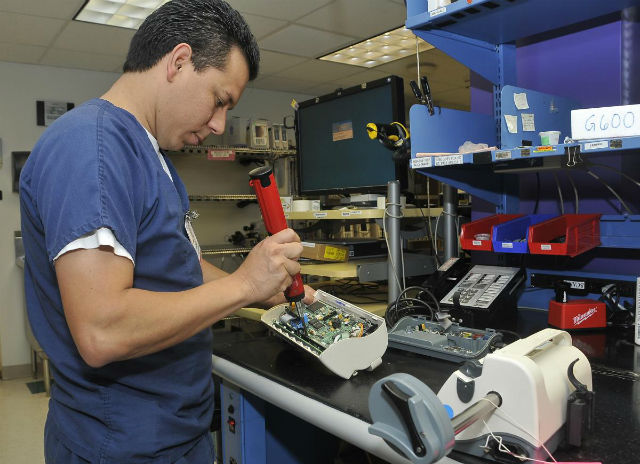Biomedical Technicians Needed for Texas Healthcare
In today’s world, advancements in medical technology have enabled better diagnosis, surgical procedures and improved patient care. With the rising demand for healthcare services and the increased complexity of biomedical equipment, this field has a great job outlook for people with training.
If you are interested in the healthcare industry, yet not particularly fond of blood or surgical procedures, biomedical technician is one of the few healthcare jobs appropriate for squeamish people. It is an exciting and stimulating career that combines knowledge from various fields, such as engineering, biology and bio-mechanical principles to design, develop, repair and maintain biological and health systems and products. In particular, the duties of a biomedical technician include testing parts, calibrating equipment, performing maintenance, and keeping repair logs of medical devices, such as monitors, imaging equipment and operating tables.
Biomedical technician jobs require working flexible hours under some pressure. Similar to other healthcare jobs, technicians sometimes have to work “on call” in case of emergencies when medical equipment needs immediate repair. They are also encouraged to stay updated on current medical technology, because the healthcare industry is increasingly dependent on the advancement of medical equipment to extend lives and improve patient treatment.
BMET – Biomedical Equipment Technician & Biomedical Electronics Technician
Two main specializations in the biomedical technician field are Biomedical Equipment Repair Technician and Biomedical Electronics Specialist. Both are responsible for testing, troubleshooting, maintaining and repairing general biomedical equipment in laboratories, healthcare facilities, and other personal care institutions. While a biomedical electronics specialist focuses more on handling and working with electronic devices themselves, a biomedical equipment technician can facilitate training sessions on medical equipment.
Employment of BMETs, similar to other healthcare jobs, is projected to grow much higher than the average job growth across industries, according to the U.S. Bureau of Labor statistics. With a two-year associate degree, a biomedical technician salary can be more than $40,000 annually to start, according to our BMET factsheet.
How to Become a Certified Biomedical Technician?
Entrance to biomedical technician jobs typically requires a biomedical technician associate degree specializing in either biomedical electronics or biomedical equipment technician. The associate program provides coursework in biomedical electronic systems, biomedical law, digital circuits, and clinical instrumentation. Additionally, laboratory experiences offer hands-on opportunities to repair and maintain medical equipment, allowing students to explore a collaborative field between healthcare and technology.
Upon graduation, students can get an internship or land a full time job in hospitals, clinics or companies that manufacture medical equipment and devices – based on their preferences for the healthcare or technology side.
While certification is not required by all employers, it can demonstrate professional capability and help people advance to supervisory positions. One of the most popular certifications for biomedical technician jobs is Certified Biomedical Equipment Technician (CBET) offered by the Association for the Advancement of Medical Instrumentation (AAMI). In order to be certified, biomedical technicians must have an associate degree, professional working experience, and pass their exam.
If you are interested in the intersection of technology and healthcare, visit our biomedical page for available programs and start your biomedical profession now!
